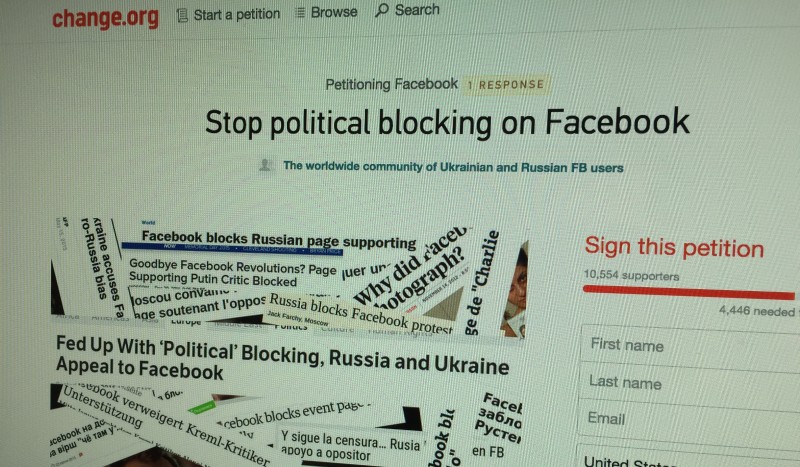
Screenshot of the “Stop Political Blocking on Facebook” petition. Change.org.
It’s taken about about two weeks and almost 11,000 signatures, but Facebook has at last responded to the “Stop Political Blocking on Facebook” petition. In a statement posted to Change.org on June 8, Thomas Myrup Kristensen, Facebook’s director of policy for Eastern Europe and Russia, explained that the social network stands by its moderation policies. Facebook has confirmed to RuNet Echo the authenticity of Kristensen’s comments.
“We recognize the importance of these debates to people, especially in times of conflict,” Kristensen wrote, before explaining that Facebook doesn’t block content or suspend users automatically. He also addressed concerns that the website might be vulnerable to coordinated attacks against certain users:
It doesn’t matter if something is reported once or 100 times, we only remove content that goes against [our] standards. We have learnt over the years that people can run campaigns to create many reports about content they don’t like and have designed our systems to prevent this leading to the removal of acceptable content.
Kristensen also responded to claims that Facebook’s moderators are poorly suited to working with Russian and Ukrainian content. The petition against “political blocking” says, “We don’t know why Facebook seems so eager to block people protesting against the Russian government’s policies. Perhaps its moderator team is not savvy enough, not large enough, or politically biased.” Kristensen ensures users that moderators are “highly trained” and “impartial”:
Within these teams we have people who speak both Russian and Ukrainian who can help give specific language context. And we have quality control systems in place to ensure that reports are decided on correctly according to the common standards.
The petition reaching out to Facebook began in late May, after several high-profile Russian and Ukrainian bloggers reported being suspended for apparently innocuous posts. According to the petition, Ukrainian artist Alexander Roytburd was blocked for “a harmless joke about Jews,” Ukrainian journalist Andrei Kapustin lost his account because of “nude” photographs of mannequins, and dozens of others were suspended over similar issues.
In mid-May, after Ukrainian President Petro Poroshenko joined the appeals to Facebook about alleged “political blocking,” Facebook-founder Mark Zuckerberg addressed some of the concerns at a question-and-answer event, saying “I think we did the right thing according to our policies,” referring to unspecified cases of hate speech by Ukrainian and Russian Facebook users.
One of the most prominent Russian bloggers to be suspended by Facebook is photographer Rustem Adagamov, who lost access to his Facebook wall after he posted images of a Norwegian museum display that included Nazi Christmas-tree decorations.
Adagamov told RuNet Echo that he doesn’t take Kristensen’s statement seriously, going so far as to say it is an embarrassment to the service’s 1.4 billion users:
Находиться в социальной сети с таким отношением к пользователям, непрозрачной политикой администрирования унизительно, думаю, для каждого. Для меня в т.ч. Жаль, что так получается.
Being part of a social network that treats its users like this, with such non-transparent moderation policies, is an insult to each of us, including me. It’s a shame that things turned out this way.
Adagamov says he considers Kristensen’s claims about manual moderation to be “pure lies,” telling RuNet Echo that he’s completely certain that Facebook does indeed rely on automated moderation that makes the site vulnerable to bot-attacks:
Я думаю, что Фейсбуку просто нет никакого дела до этой проблемы, модерацию они осуществляют с помощью автоматизированной системы и вникать в детали не могут и не хотят. Этим обстоятельством воспользовались нанятые российскими властями менеджеры и поставили на поток это дело.
I think Facebook simply doesn’t care about this problem. Their moderation is carried out using an automated system and they’re neither able nor interested in revealing its details. [Public relations] managers hired by the Russian authorities are exploiting these circumstances and going to town with this.
This is not the first time Facebook has insisted publicly that bots and trolls cannot influence decisions to censor its users and their content. In October 2014, the website’s vice president for public policy in Europe said the same thing, claiming that Facebook doesn’t treat large volumes of complaints as a “good indicator” of whether or not content violates of the site's policies. Statements like this, however, have done fairly little to placate Facebook’s critics in Russia and Ukraine.
As long as people can disagree about what truly violates the website’s terms of service, and until Facebook grants users more transparency about how specific decisions to block content are made, both sides of this conflict seem determined not to budge.
Facebook's Zuckerberg Responds to Ukrainians’ Complaints, But Is His Answer Enough?
Fed Up With ‘Political’ Blocking, Russia and Ukraine Appeal to Facebook








6 comments
A “harmless joke about Jews,” huh..
he’s jewish, “huh”
http://miggerrtis.livejournal.com/676495.html (in Russian)
A living being called “Viktoriya Coletta” published a filthy anti-semitic comment on Facebook, and the comment wasn’t banned.
http://www.svoboda.org/content/article/27069025.html (in Russian)
Would FB block such kind of article?
What FB says is a bullshit. Politically motivated blockings of Ukrainian users, reported by thousands of russian trolls, continues.